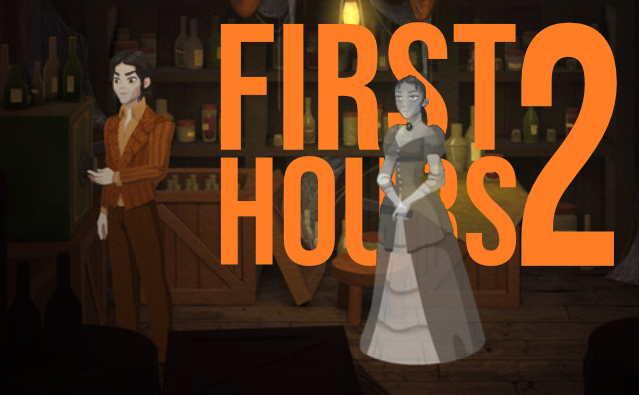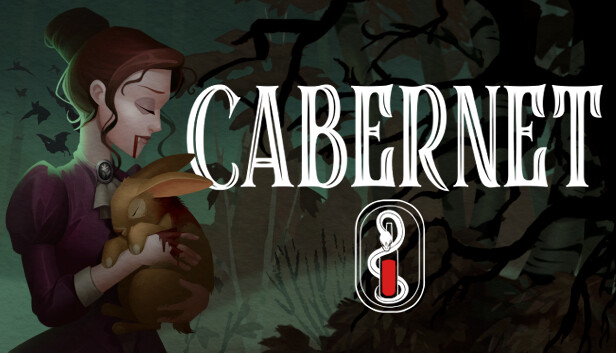Blood Is Thicker Than Cabernet: A Fresh Take on Vampire Gaming
Every choice in Cabernet leaves a mark—some written in ink, others in blood. As newly-turned vampire Lisa, you'll navigate Victorian society's deadly etiquette where a social misstep can be as fatal as sunrise, and your thirst for blood is only the beginning.

TL;DR:
Introduction: Fangs for the Memories
Look, I'm gonna level with you—I've played a lot of vampire games. From the gothic majesty of Castlevania to the bloody streets of Vampire: The Masquerade, I thought I'd seen it all. But then Cabernet came along and proved that there's still fresh blood to be drawn from this centuries-old mythos.
From the moment I fired up Cabernet, I was greeted with perhaps the most minimalist options menu I've seen this side of 2010—language, controller type, and screen resolution. That's it. No fancy graphics toggles, no audio tweaking, nothing. Just three lonely options staring back at me like they're embarrassed to be there. It's almost refreshing in its simplicity, if not slightly concerning.
But hey, we're not here for the options menu. We're here to become the night, to feast on the blood of the innocent, and to navigate what might be the most awkward vampire social gathering since Edward Cullen went to high school.

Setting & Story: Victorian Vamping
Cabernet drops you into the elegant yet ominous world of late 19th-century vampire society. You play as Liza, a newly turned vampire who wakes up to discover that her life (or unlife) has taken a dramatic turn. The game wastes little time throwing you into the deep end of vampire politics and etiquette, where one wrong move could mean meeting the business end of a stake—or worse, social ostracism.
The central hub of activity is the Countess's manor, a lavish setting dripping with Victorian opulence and subtle menace. The Countess herself remains an enigmatic figure, clearly powerful and demanding respect from her undead subjects. The game cleverly builds tension through conversations and environmental storytelling, creating a world that feels lived-in (or un-lived-in, if you prefer) for centuries.
What sets Cabernet apart from other vampire narratives is its focus on the psychological adjustment to vampire existence rather than just the physical aspects. Liza's internal struggle with her new reality provides a compelling emotional core to what could have been just another supernatural power fantasy.
Gameplay: Bite-Sized Mechanics
The gameplay in Cabernet can best be described as a vampire life simulator with RPG elements and light adventure game mechanics. The core loop revolves around managing your thirst for blood, developing your vampiric abilities, and navigating social situations with both humans and fellow vampires.
Combat is barely present, which is a bold choice for a vampire game. Instead, the focus is on choice-driven dialogue and skill development that shapes your vampire's capabilities and standing in undead society.
The skill system is particularly interesting, with categories like Literature & Writing, History & Politics, and Science allowing you to specialize your character. These skills unlock new dialogue options and approaches to problem-solving, creating genuine replay-ability as different skill combinations yield vastly different experiences.
The most unique mechanic is the "enchantment" system—essentially vampire hypnosis. This ability allows you to influence humans who are favorably disposed toward you, making them suggestible or setting them up as a blood source. The ethical implications of this power are not glossed over, adding a layer of moral complexity to your vampiric actions.
Then there's the transformation ability, allowing you to shift into bat form to access new areas or escape dangerous situations. While not revolutionary, the implementation feels satisfying, especially when using it to discover hidden locations or eavesdrop on conversations.

Characters: Fangs for the Memories
Cabernet's character roster is populated with memorable personalities that elevate the experience. From Liza herself, whose journey from confused fledgling to confident vampire forms the emotional core of the game, to the enigmatic Countess whose true motivations remain shrouded in mystery.
One standout is Petya, who combines wit with an unsettling obsession with his doll Matilda. The voice acting here is top-notch (BDG, is that you?), delivering lines with just the right balance of charm and creepiness.
Hussar serves as your vampire mentor, teaching you the ways of the night with a blend of strict guidance and unexpected compassion. His whistling enchantment technique and practical approach to vampirism provide some of the game's most instructive moments.
Then there are the three vampires responsible for draining a human dry at the Countess's manor—a cardinal sin not for moral reasons, but because it draws unwanted attention to vampire society. Their squabbling and finger-pointing showcase the pettiness that persists even in immortal beings.
The human characters serve primarily as potential blood sources or obstacles, but some, like Trofim, the Countess's servant, provide interesting windows into how vampires maintain their secrecy in human society.
Visuals & Sound: Crimson and Claret
Graphically, Cabernet embraces a stylized aesthetic that prioritizes atmosphere over photorealism. The Victorian setting is rendered with attention to period detail, from the ornate furnishings of the manor to the fashion of the characters. Lighting plays a crucial role, with candlelight and moonbeams creating appropriately gothic shadows.
The color palette leans heavily on deep reds, midnight blues, and rich browns—creating a visual experience that feels like a moving oil painting from the period. Blood, when it appears, is treated with appropriate visual weight, appearing both enticing to your vampire character and slightly disturbing to the player.
Sound design deserves special mention, particularly the voice acting which brings the characters vividly to life. The background music knows when to swell during dramatic moments and when to recede into ambient atmospheric tones that heighten the tension without becoming intrusive.
The Good, the Bad, and the Bloody
Cabernet's strongest asset is its commitment to exploring the psychological aspects of vampirism. Rather than simply making you an all-powerful bloodsucker, the game forces you to confront the ethical implications of your new existence. The moment where you must decide whether to feed for the first time carries genuine emotional weight, and your decision has lasting consequences.
The dialogue system is nuanced and reactive to your choices, making conversations feel consequential rather than mere info dumps. The writing quality is consistently high, blending period-appropriate formality with moments of sharp humor.
However, the game isn't without flaws. The limited options menu I mentioned earlier is indicative of a certain barebones approach to some aspects of the experience. Movement can occasionally feel stiff, particularly during the bat transformation sequences. And while the focus on social dynamics over combat is refreshing, some players might find the pacing too slow, especially in the early hours.
The biggest issue might be the somewhat limited scope of the game world. While the Countess's manor and its immediate surroundings are well-realized, you'll find yourself revisiting the same locations frequently, which can create a sense of confinement—though this could be interpreted as a thematic choice reflecting Liza's new restricted existence.
Conclusion: Worth Sinking Your Teeth Into?
Cabernet offers a fresh take on vampire fiction by focusing on the social and psychological aspects of undead existence rather than just the supernatural powers. It's a game about choices and consequences, about learning to navigate a new identity, and about finding your place in a society with rules as old as the night itself.
Is it perfect? No. But its flaws are easily overlooked given the strength of its writing, the depth of its character development, and the genuinely interesting choices it offers players. It's a game that respects your intelligence and isn't afraid to make you uncomfortable with the realities of vampirism.
If you're looking for a fast-paced action game where you tear through hordes of enemies with your vampire powers, Cabernet isn't it. But if you want a thoughtful, character-driven experience that explores the darker aspects of immortality while still delivering moments of macabre humor, you'll find plenty to sink your teeth into here.
For a game about the undead, Cabernet has a surprising amount of heart. And blood. Lots and lots of blood.
Final Score: 4/5 Waffles
Pros:
- Rich, atmospheric setting that brings vampire society to life
- Strong writing and character development
- Meaningful choices with lasting consequences
- Unique "enchantment" mechanics that add depth to interactions
- Excellent voice acting that elevates the narrative
Cons:
- Limited game world that can feel repetitive
- Some stiff animations and movement
- Minimal options for customizing the experience
- Slower pacing might not appeal to action-oriented gamers
- Tutorial elements sometimes feel too hand-holding
In the immortal words of our vampire mentor Hussar, "Everyone lives with their own choices." In Cabernet, those choices matter more than most, making this one vampire game that won't leave you feeling drained.
Frequently Asked Questions
1. What kind of game is Cabernet?
Cabernet is primarily a narrative-driven vampire life simulator with RPG elements and light adventure mechanics. It focuses on choice-driven dialogue, skill development, and social navigation rather than combat.
2. How long does it take to complete Cabernet?
A single play-through takes approximately 10-12 hours, though the multiple branching storylines and different skill paths offer significant replay value.
3. Is there combat in the game?
Combat is minimal in Cabernet. The gameplay emphasizes social interactions, moral choices, and using vampire abilities like enchantment and transformation to navigate situations.
4. Can you play as different types of vampires?
While you always play as Liza, you can develop different vampire "styles" through skill choices and moral decisions, effectively creating anything from a reluctant humanitarian vampire to a ruthless predator.
5. Does the game have multiple endings?
Yes, Cabernet features several distinct endings based on your major choices throughout the game and your relationships with key characters.
6. What platforms is Cabernet available on?
Currently, Cabernet is available on PC through Steam. Console releases may be announced in the future.
7. Are there romance options in the game?
Yes, there are several potential romance options among both vampire and human characters, each with their own relationship paths and complications.
8. How does the "enchantment" system work?
Enchantment allows you to temporarily hypnotize humans who have a positive relationship with you. This can be used to feed without killing, alter memories, or influence behavior, but comes with ethical implications.
9. Can you die in the game?
Yes, permanent death can occur if you're exposed to sunlight without access to your vessel (coffin), or through certain story choices. The game uses autosaves, so these consequences are permanent.
10. Is the game historically accurate to the Victorian era?
While Cabernet captures the aesthetic and social atmosphere of the late 19th century, it takes creative liberties for storytelling purposes and incorporates various vampire mythologies that transcend the Victorian setting.





